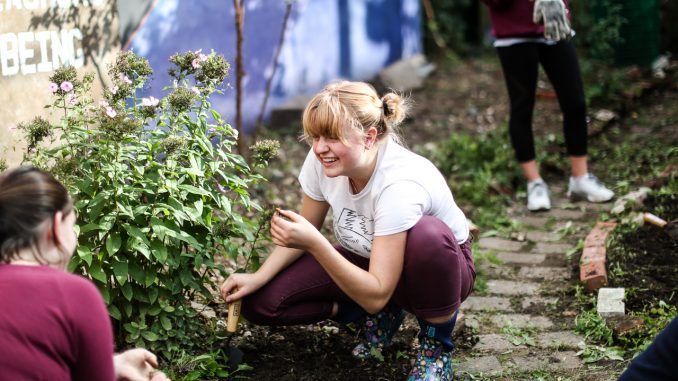
One year ago, Rabia King promised herself that by the time she turned 20 she would never buy single-use plastic again.
“I saw that it was definitely possible to drastically reduce the waste I personally produce,” said King, a freshman environmental science major who is on a temporary leave of absence. “I wanted a hard and fast time to achieve that by.”
King, secretary of Temple Community Garden, spent six months researching the zero-waste movement and learning about the impact garbage has on the environment.
Participants of the zero-waste movement aim to completely eliminate the amount of trash they produce, which includes everything from discardable plastic to single-use items like wrappers or plastic utensils, according to Planet Aid, a nonprofit organization that supports sustainable development.
King started using reusable utensils, water bottles and bags. Now she also buys food in bulk and brings her own jars to put produce into at farmers markets.
Caroline Burkholder, the sustainability coordinator in the Office of Sustainability, said another purpose of zero-waste living is to reevaluate how people consume products.
“It starts with your own relationship with consumer goods,” Burkholder said. “And here in the office we try to make it easier for folks to get reusable materials and inform them on how to reduce waste.”
While Temple University students get involved in the zero-waste movement, the Office of Sustainability works on reducing and studying waste on campus.
Kathleen Grady, the director of the Office of Sustainability, said her office is organizing a waste composition study, also known as a waste sort, to evaluate the components of Temple’s trash.
“Right now we are in the process of hiring someone to give a waste composition study to see what’s making up our trash,” Grady said. “Hopefully that report can help with a strategy plan to further reduce waste.”
Andie Corno, a junior corporate finance major, said Temple should at least offer composting resources for students as a way to eliminate waste on and off campus.
“The lack of composting is so wilding to me,” Corno said “We have so many food waste and paper products that pile up and it works me up because it’s so easy to compost.”
Corno added she’s shocked that what most students recycle off-campus are big cardboard pieces, throwing away cans and bottles.
But going waste-free comes with challenges.
King said as she educated herself on the movement she decided it’s not entirely possible to produce “zero” waste.
“The term zero waste is misleading because there is no such a thing,” King said. “On one level, I’m living more consciously when I’m not buying takeout, but there’s still plastic in the bulk bin.”
Grady said she believes the zero-waste movement is attainable if individuals rethink their consumption, including how the amount of plastic they buy affects the environment.
“To get us closer to that goal we need to do a lot of thoughtful planning,” Grady said. “And thinking of the way we consume our products.”
Like King, Corno also sees the limitations of the movement’s mission to completely eliminate waste.
“You can have minimal waste in what you produce,” Corno said. “But when you’re buying things and engaging with companies, you’re still contributing to the waste that they produce by buying their products.“
She added she recommends people find replacements for their single-use items and make smarter choices like using recyclable items. The Office of Sustainability has online resources about alternatives to single-use items, like compostable bamboo toothbrushes and unwrapped bar soap bought in bulk.
Grady and Burkholder both said the office plans to help students foster a better understanding of recycling this school year. Temple’s Welcome Wagon, an annual program that distributes household items to students, and RecycleMania, an international competition raising student awareness of campus recycling, will help reverse conceptions of what is recyclable and how to properly dispose of items on campus.
The Office of Sustainability also encourages students to reduce waste by using the Twitter hashtag #WastelessWednesday and through the Pop-Up Thrift shop, which sells affordable clothing left behind in residence halls to help fund the Cherry Pantry, a pantry for students experiencing food insecurity.
“It’s important to have conversations and empower students on what they can do,” Burkholder said. “We need to encourage individual students to use reusable materials.”


Be the first to comment